Reflective Essay: Developing Therapeutic Communication in Nursing
VerifiedAdded on 2023/06/12
|16
|4358
|195
Essay
AI Summary
This essay is a reflective analysis of the author's professional communication skills in two nurse-patient interactions. Using a self-analysis tool, the author identifies both strengths and weaknesses in their communication, particularly in areas like active listening, reflection, clarification, and paraphrasing. The essay explores the importance of therapeutic communication in patient assessment, adherence to healthcare policies, and demonstration of patient-centered care. It also discusses relevant communication models and techniques for building effective nurse-patient relationships, emphasizing the need for trust, empathy, and mutual respect. The reflection highlights the author's limitations and outlines an action plan for improving communication skills to enhance professional development and patient care. This document is available on Desklib, a platform offering study tools and resources for students.
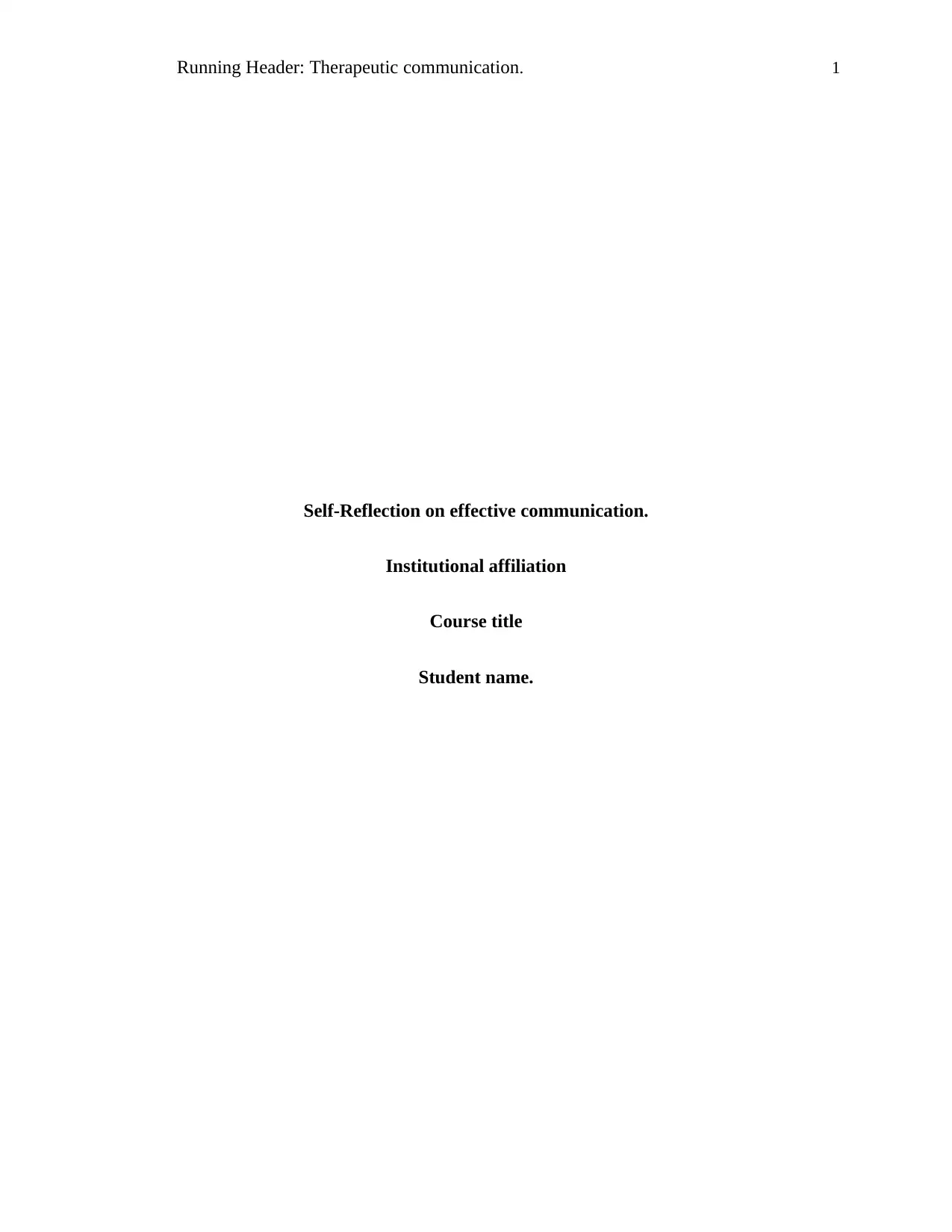
Running Header: Therapeutic communication. 1
Self-Reflection on effective communication.
Institutional affiliation
Course title
Student name.
Self-Reflection on effective communication.
Institutional affiliation
Course title
Student name.
Paraphrase This Document
Need a fresh take? Get an instant paraphrase of this document with our AI Paraphraser
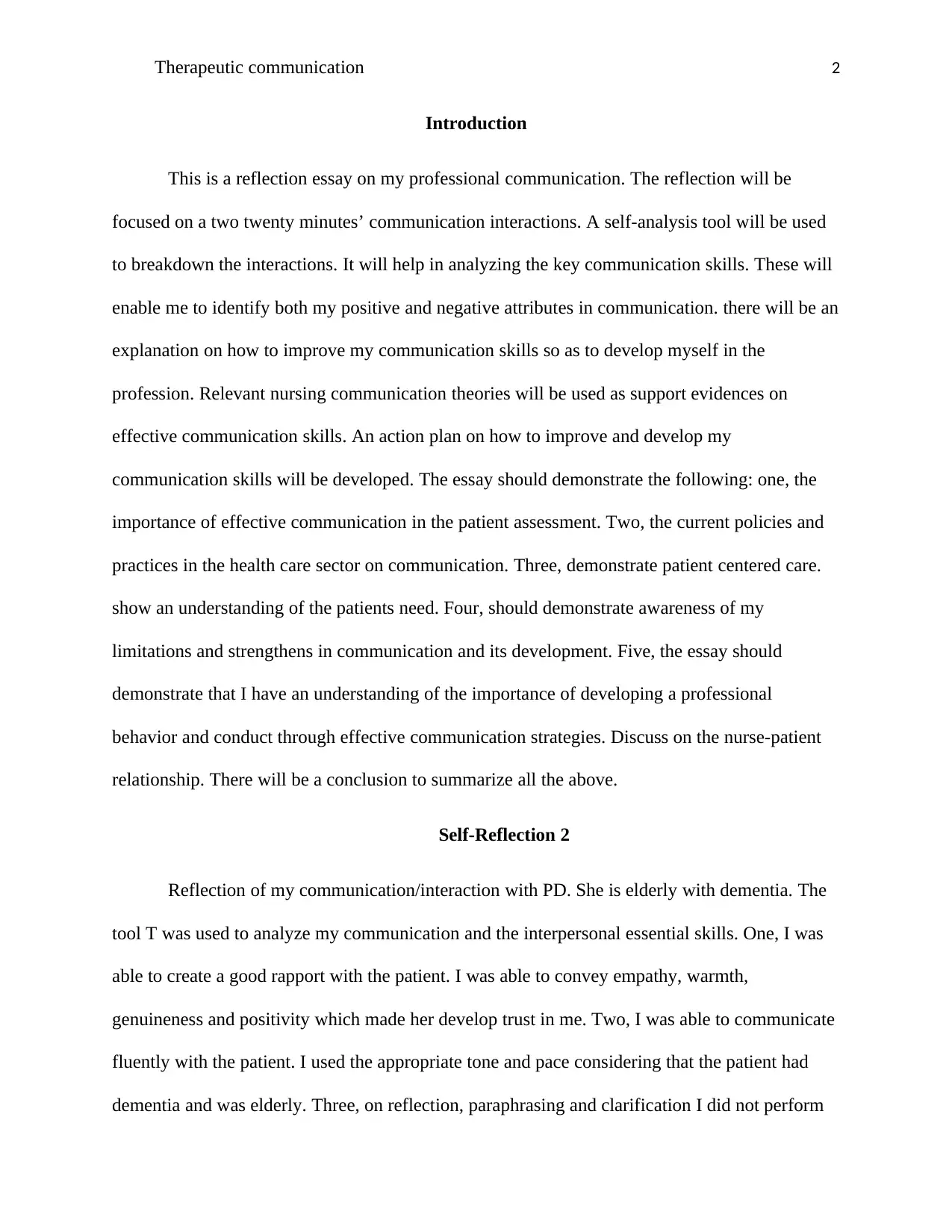
Therapeutic communication 2
Introduction
This is a reflection essay on my professional communication. The reflection will be
focused on a two twenty minutes’ communication interactions. A self-analysis tool will be used
to breakdown the interactions. It will help in analyzing the key communication skills. These will
enable me to identify both my positive and negative attributes in communication. there will be an
explanation on how to improve my communication skills so as to develop myself in the
profession. Relevant nursing communication theories will be used as support evidences on
effective communication skills. An action plan on how to improve and develop my
communication skills will be developed. The essay should demonstrate the following: one, the
importance of effective communication in the patient assessment. Two, the current policies and
practices in the health care sector on communication. Three, demonstrate patient centered care.
show an understanding of the patients need. Four, should demonstrate awareness of my
limitations and strengthens in communication and its development. Five, the essay should
demonstrate that I have an understanding of the importance of developing a professional
behavior and conduct through effective communication strategies. Discuss on the nurse-patient
relationship. There will be a conclusion to summarize all the above.
Self-Reflection 2
Reflection of my communication/interaction with PD. She is elderly with dementia. The
tool T was used to analyze my communication and the interpersonal essential skills. One, I was
able to create a good rapport with the patient. I was able to convey empathy, warmth,
genuineness and positivity which made her develop trust in me. Two, I was able to communicate
fluently with the patient. I used the appropriate tone and pace considering that the patient had
dementia and was elderly. Three, on reflection, paraphrasing and clarification I did not perform
Introduction
This is a reflection essay on my professional communication. The reflection will be
focused on a two twenty minutes’ communication interactions. A self-analysis tool will be used
to breakdown the interactions. It will help in analyzing the key communication skills. These will
enable me to identify both my positive and negative attributes in communication. there will be an
explanation on how to improve my communication skills so as to develop myself in the
profession. Relevant nursing communication theories will be used as support evidences on
effective communication skills. An action plan on how to improve and develop my
communication skills will be developed. The essay should demonstrate the following: one, the
importance of effective communication in the patient assessment. Two, the current policies and
practices in the health care sector on communication. Three, demonstrate patient centered care.
show an understanding of the patients need. Four, should demonstrate awareness of my
limitations and strengthens in communication and its development. Five, the essay should
demonstrate that I have an understanding of the importance of developing a professional
behavior and conduct through effective communication strategies. Discuss on the nurse-patient
relationship. There will be a conclusion to summarize all the above.
Self-Reflection 2
Reflection of my communication/interaction with PD. She is elderly with dementia. The
tool T was used to analyze my communication and the interpersonal essential skills. One, I was
able to create a good rapport with the patient. I was able to convey empathy, warmth,
genuineness and positivity which made her develop trust in me. Two, I was able to communicate
fluently with the patient. I used the appropriate tone and pace considering that the patient had
dementia and was elderly. Three, on reflection, paraphrasing and clarification I did not perform
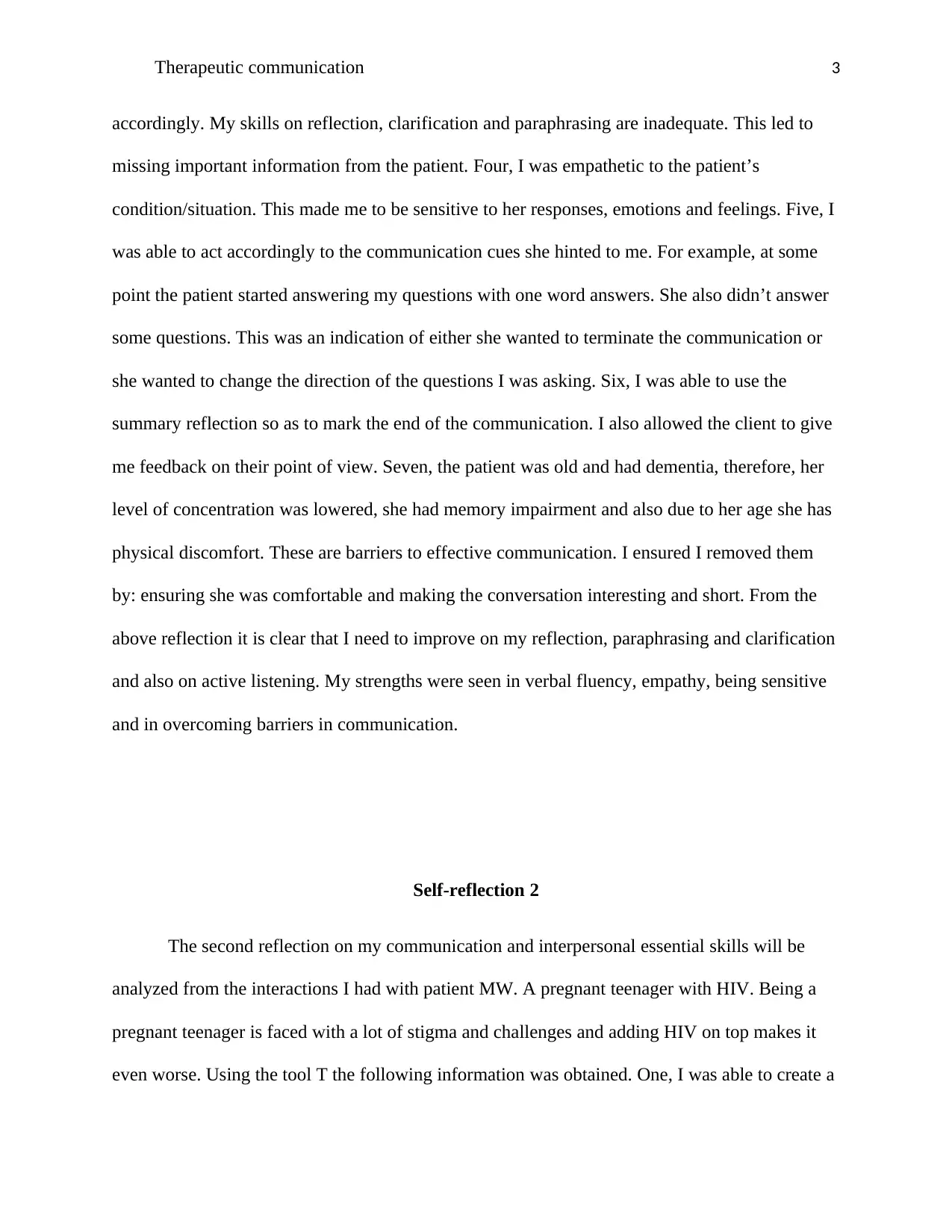
Therapeutic communication 3
accordingly. My skills on reflection, clarification and paraphrasing are inadequate. This led to
missing important information from the patient. Four, I was empathetic to the patient’s
condition/situation. This made me to be sensitive to her responses, emotions and feelings. Five, I
was able to act accordingly to the communication cues she hinted to me. For example, at some
point the patient started answering my questions with one word answers. She also didn’t answer
some questions. This was an indication of either she wanted to terminate the communication or
she wanted to change the direction of the questions I was asking. Six, I was able to use the
summary reflection so as to mark the end of the communication. I also allowed the client to give
me feedback on their point of view. Seven, the patient was old and had dementia, therefore, her
level of concentration was lowered, she had memory impairment and also due to her age she has
physical discomfort. These are barriers to effective communication. I ensured I removed them
by: ensuring she was comfortable and making the conversation interesting and short. From the
above reflection it is clear that I need to improve on my reflection, paraphrasing and clarification
and also on active listening. My strengths were seen in verbal fluency, empathy, being sensitive
and in overcoming barriers in communication.
Self-reflection 2
The second reflection on my communication and interpersonal essential skills will be
analyzed from the interactions I had with patient MW. A pregnant teenager with HIV. Being a
pregnant teenager is faced with a lot of stigma and challenges and adding HIV on top makes it
even worse. Using the tool T the following information was obtained. One, I was able to create a
accordingly. My skills on reflection, clarification and paraphrasing are inadequate. This led to
missing important information from the patient. Four, I was empathetic to the patient’s
condition/situation. This made me to be sensitive to her responses, emotions and feelings. Five, I
was able to act accordingly to the communication cues she hinted to me. For example, at some
point the patient started answering my questions with one word answers. She also didn’t answer
some questions. This was an indication of either she wanted to terminate the communication or
she wanted to change the direction of the questions I was asking. Six, I was able to use the
summary reflection so as to mark the end of the communication. I also allowed the client to give
me feedback on their point of view. Seven, the patient was old and had dementia, therefore, her
level of concentration was lowered, she had memory impairment and also due to her age she has
physical discomfort. These are barriers to effective communication. I ensured I removed them
by: ensuring she was comfortable and making the conversation interesting and short. From the
above reflection it is clear that I need to improve on my reflection, paraphrasing and clarification
and also on active listening. My strengths were seen in verbal fluency, empathy, being sensitive
and in overcoming barriers in communication.
Self-reflection 2
The second reflection on my communication and interpersonal essential skills will be
analyzed from the interactions I had with patient MW. A pregnant teenager with HIV. Being a
pregnant teenager is faced with a lot of stigma and challenges and adding HIV on top makes it
even worse. Using the tool T the following information was obtained. One, I was able to create a
⊘ This is a preview!⊘
Do you want full access?
Subscribe today to unlock all pages.

Trusted by 1+ million students worldwide
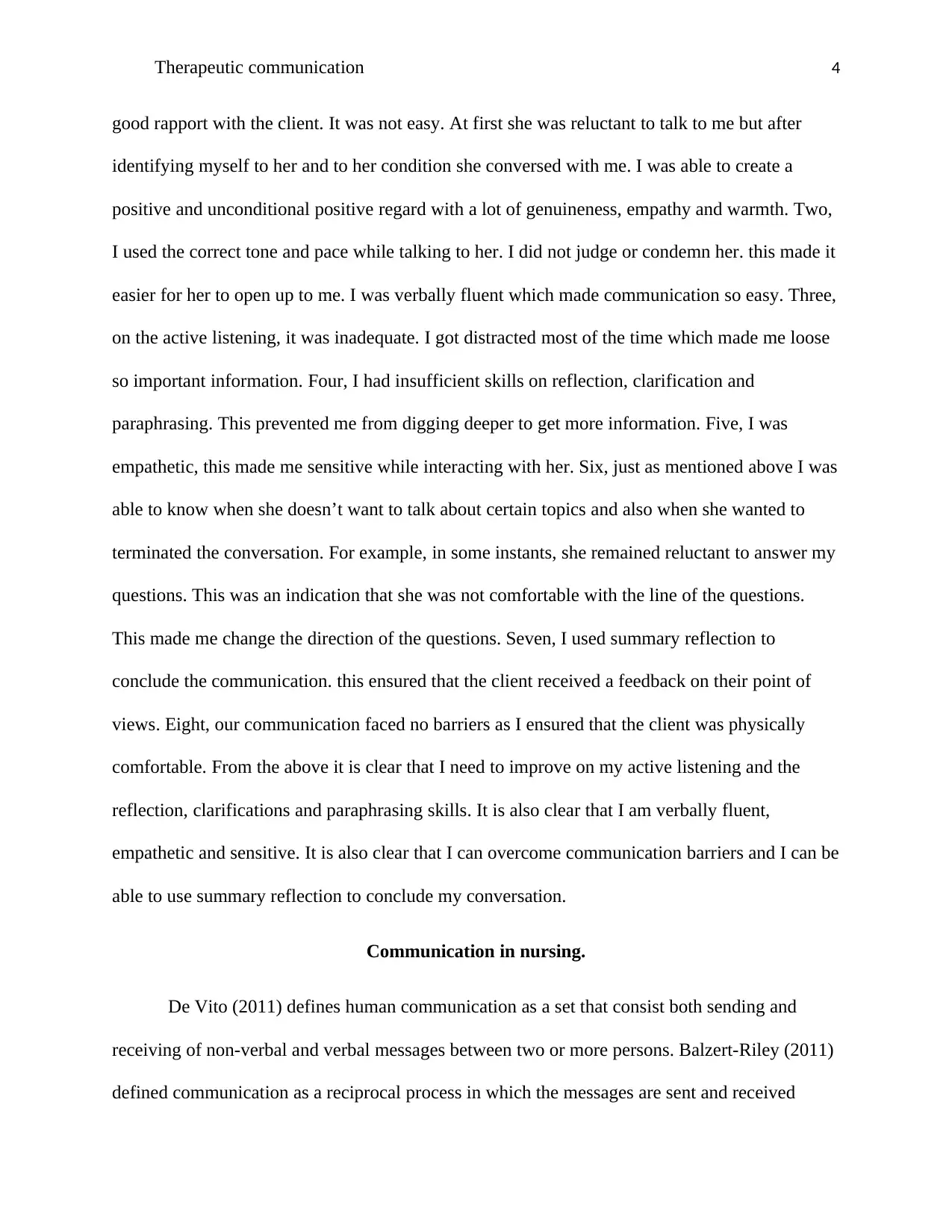
Therapeutic communication 4
good rapport with the client. It was not easy. At first she was reluctant to talk to me but after
identifying myself to her and to her condition she conversed with me. I was able to create a
positive and unconditional positive regard with a lot of genuineness, empathy and warmth. Two,
I used the correct tone and pace while talking to her. I did not judge or condemn her. this made it
easier for her to open up to me. I was verbally fluent which made communication so easy. Three,
on the active listening, it was inadequate. I got distracted most of the time which made me loose
so important information. Four, I had insufficient skills on reflection, clarification and
paraphrasing. This prevented me from digging deeper to get more information. Five, I was
empathetic, this made me sensitive while interacting with her. Six, just as mentioned above I was
able to know when she doesn’t want to talk about certain topics and also when she wanted to
terminated the conversation. For example, in some instants, she remained reluctant to answer my
questions. This was an indication that she was not comfortable with the line of the questions.
This made me change the direction of the questions. Seven, I used summary reflection to
conclude the communication. this ensured that the client received a feedback on their point of
views. Eight, our communication faced no barriers as I ensured that the client was physically
comfortable. From the above it is clear that I need to improve on my active listening and the
reflection, clarifications and paraphrasing skills. It is also clear that I am verbally fluent,
empathetic and sensitive. It is also clear that I can overcome communication barriers and I can be
able to use summary reflection to conclude my conversation.
Communication in nursing.
De Vito (2011) defines human communication as a set that consist both sending and
receiving of non-verbal and verbal messages between two or more persons. Balzert-Riley (2011)
defined communication as a reciprocal process in which the messages are sent and received
good rapport with the client. It was not easy. At first she was reluctant to talk to me but after
identifying myself to her and to her condition she conversed with me. I was able to create a
positive and unconditional positive regard with a lot of genuineness, empathy and warmth. Two,
I used the correct tone and pace while talking to her. I did not judge or condemn her. this made it
easier for her to open up to me. I was verbally fluent which made communication so easy. Three,
on the active listening, it was inadequate. I got distracted most of the time which made me loose
so important information. Four, I had insufficient skills on reflection, clarification and
paraphrasing. This prevented me from digging deeper to get more information. Five, I was
empathetic, this made me sensitive while interacting with her. Six, just as mentioned above I was
able to know when she doesn’t want to talk about certain topics and also when she wanted to
terminated the conversation. For example, in some instants, she remained reluctant to answer my
questions. This was an indication that she was not comfortable with the line of the questions.
This made me change the direction of the questions. Seven, I used summary reflection to
conclude the communication. this ensured that the client received a feedback on their point of
views. Eight, our communication faced no barriers as I ensured that the client was physically
comfortable. From the above it is clear that I need to improve on my active listening and the
reflection, clarifications and paraphrasing skills. It is also clear that I am verbally fluent,
empathetic and sensitive. It is also clear that I can overcome communication barriers and I can be
able to use summary reflection to conclude my conversation.
Communication in nursing.
De Vito (2011) defines human communication as a set that consist both sending and
receiving of non-verbal and verbal messages between two or more persons. Balzert-Riley (2011)
defined communication as a reciprocal process in which the messages are sent and received
Paraphrase This Document
Need a fresh take? Get an instant paraphrase of this document with our AI Paraphraser
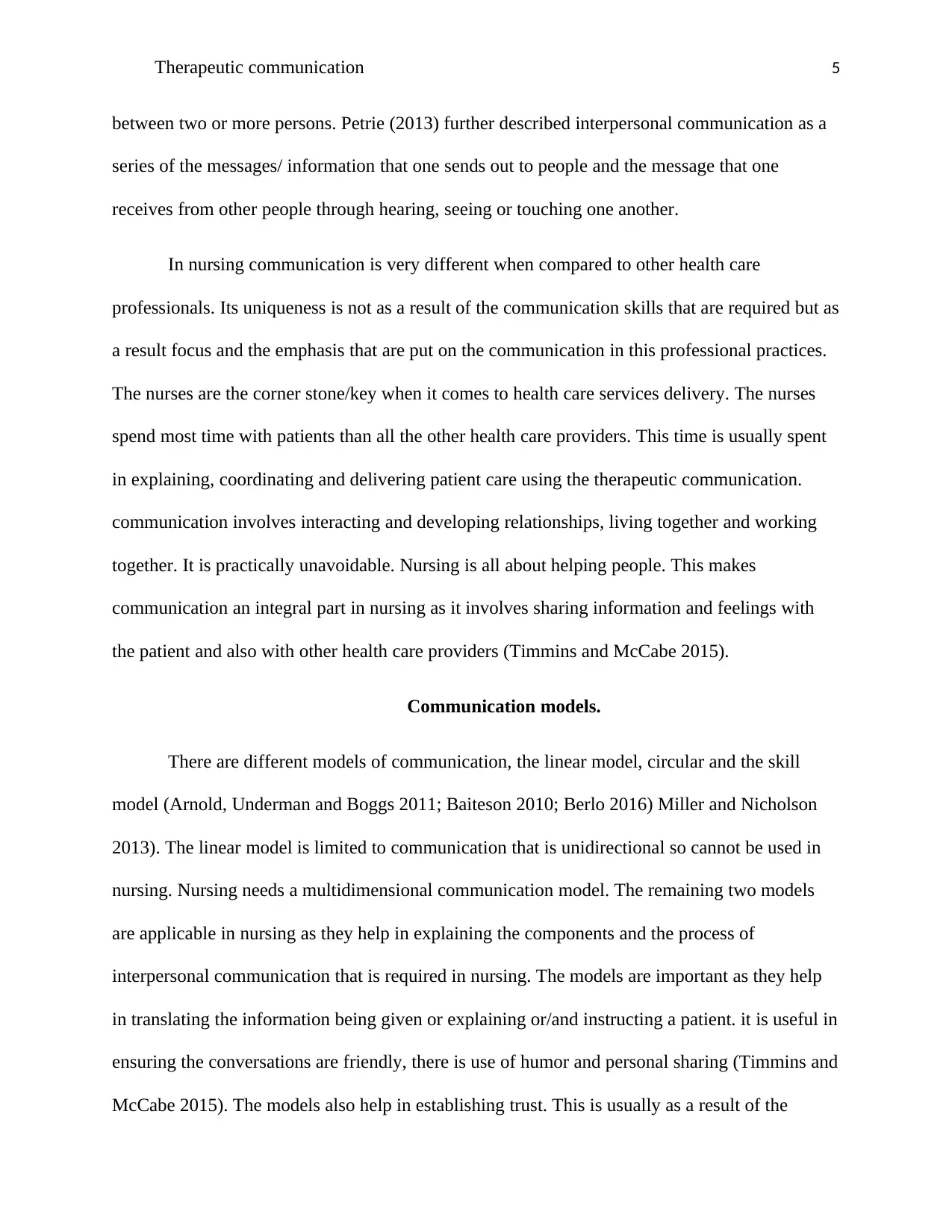
Therapeutic communication 5
between two or more persons. Petrie (2013) further described interpersonal communication as a
series of the messages/ information that one sends out to people and the message that one
receives from other people through hearing, seeing or touching one another.
In nursing communication is very different when compared to other health care
professionals. Its uniqueness is not as a result of the communication skills that are required but as
a result focus and the emphasis that are put on the communication in this professional practices.
The nurses are the corner stone/key when it comes to health care services delivery. The nurses
spend most time with patients than all the other health care providers. This time is usually spent
in explaining, coordinating and delivering patient care using the therapeutic communication.
communication involves interacting and developing relationships, living together and working
together. It is practically unavoidable. Nursing is all about helping people. This makes
communication an integral part in nursing as it involves sharing information and feelings with
the patient and also with other health care providers (Timmins and McCabe 2015).
Communication models.
There are different models of communication, the linear model, circular and the skill
model (Arnold, Underman and Boggs 2011; Baiteson 2010; Berlo 2016) Miller and Nicholson
2013). The linear model is limited to communication that is unidirectional so cannot be used in
nursing. Nursing needs a multidimensional communication model. The remaining two models
are applicable in nursing as they help in explaining the components and the process of
interpersonal communication that is required in nursing. The models are important as they help
in translating the information being given or explaining or/and instructing a patient. it is useful in
ensuring the conversations are friendly, there is use of humor and personal sharing (Timmins and
McCabe 2015). The models also help in establishing trust. This is usually as a result of the
between two or more persons. Petrie (2013) further described interpersonal communication as a
series of the messages/ information that one sends out to people and the message that one
receives from other people through hearing, seeing or touching one another.
In nursing communication is very different when compared to other health care
professionals. Its uniqueness is not as a result of the communication skills that are required but as
a result focus and the emphasis that are put on the communication in this professional practices.
The nurses are the corner stone/key when it comes to health care services delivery. The nurses
spend most time with patients than all the other health care providers. This time is usually spent
in explaining, coordinating and delivering patient care using the therapeutic communication.
communication involves interacting and developing relationships, living together and working
together. It is practically unavoidable. Nursing is all about helping people. This makes
communication an integral part in nursing as it involves sharing information and feelings with
the patient and also with other health care providers (Timmins and McCabe 2015).
Communication models.
There are different models of communication, the linear model, circular and the skill
model (Arnold, Underman and Boggs 2011; Baiteson 2010; Berlo 2016) Miller and Nicholson
2013). The linear model is limited to communication that is unidirectional so cannot be used in
nursing. Nursing needs a multidimensional communication model. The remaining two models
are applicable in nursing as they help in explaining the components and the process of
interpersonal communication that is required in nursing. The models are important as they help
in translating the information being given or explaining or/and instructing a patient. it is useful in
ensuring the conversations are friendly, there is use of humor and personal sharing (Timmins and
McCabe 2015). The models also help in establishing trust. This is usually as a result of the
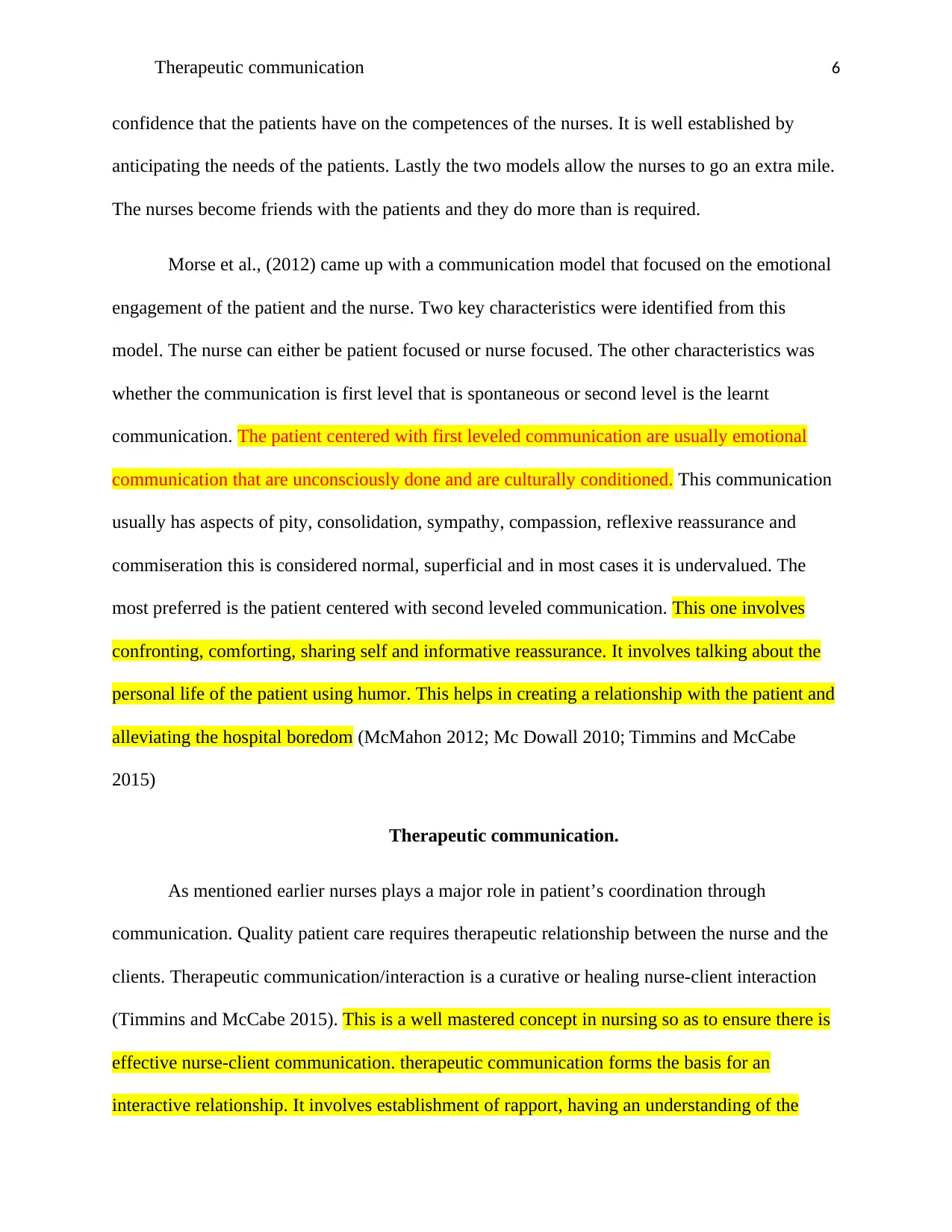
Therapeutic communication 6
confidence that the patients have on the competences of the nurses. It is well established by
anticipating the needs of the patients. Lastly the two models allow the nurses to go an extra mile.
The nurses become friends with the patients and they do more than is required.
Morse et al., (2012) came up with a communication model that focused on the emotional
engagement of the patient and the nurse. Two key characteristics were identified from this
model. The nurse can either be patient focused or nurse focused. The other characteristics was
whether the communication is first level that is spontaneous or second level is the learnt
communication. The patient centered with first leveled communication are usually emotional
communication that are unconsciously done and are culturally conditioned. This communication
usually has aspects of pity, consolidation, sympathy, compassion, reflexive reassurance and
commiseration this is considered normal, superficial and in most cases it is undervalued. The
most preferred is the patient centered with second leveled communication. This one involves
confronting, comforting, sharing self and informative reassurance. It involves talking about the
personal life of the patient using humor. This helps in creating a relationship with the patient and
alleviating the hospital boredom (McMahon 2012; Mc Dowall 2010; Timmins and McCabe
2015)
Therapeutic communication.
As mentioned earlier nurses plays a major role in patient’s coordination through
communication. Quality patient care requires therapeutic relationship between the nurse and the
clients. Therapeutic communication/interaction is a curative or healing nurse-client interaction
(Timmins and McCabe 2015). This is a well mastered concept in nursing so as to ensure there is
effective nurse-client communication. therapeutic communication forms the basis for an
interactive relationship. It involves establishment of rapport, having an understanding of the
confidence that the patients have on the competences of the nurses. It is well established by
anticipating the needs of the patients. Lastly the two models allow the nurses to go an extra mile.
The nurses become friends with the patients and they do more than is required.
Morse et al., (2012) came up with a communication model that focused on the emotional
engagement of the patient and the nurse. Two key characteristics were identified from this
model. The nurse can either be patient focused or nurse focused. The other characteristics was
whether the communication is first level that is spontaneous or second level is the learnt
communication. The patient centered with first leveled communication are usually emotional
communication that are unconsciously done and are culturally conditioned. This communication
usually has aspects of pity, consolidation, sympathy, compassion, reflexive reassurance and
commiseration this is considered normal, superficial and in most cases it is undervalued. The
most preferred is the patient centered with second leveled communication. This one involves
confronting, comforting, sharing self and informative reassurance. It involves talking about the
personal life of the patient using humor. This helps in creating a relationship with the patient and
alleviating the hospital boredom (McMahon 2012; Mc Dowall 2010; Timmins and McCabe
2015)
Therapeutic communication.
As mentioned earlier nurses plays a major role in patient’s coordination through
communication. Quality patient care requires therapeutic relationship between the nurse and the
clients. Therapeutic communication/interaction is a curative or healing nurse-client interaction
(Timmins and McCabe 2015). This is a well mastered concept in nursing so as to ensure there is
effective nurse-client communication. therapeutic communication forms the basis for an
interactive relationship. It involves establishment of rapport, having an understanding of the
⊘ This is a preview!⊘
Do you want full access?
Subscribe today to unlock all pages.

Trusted by 1+ million students worldwide
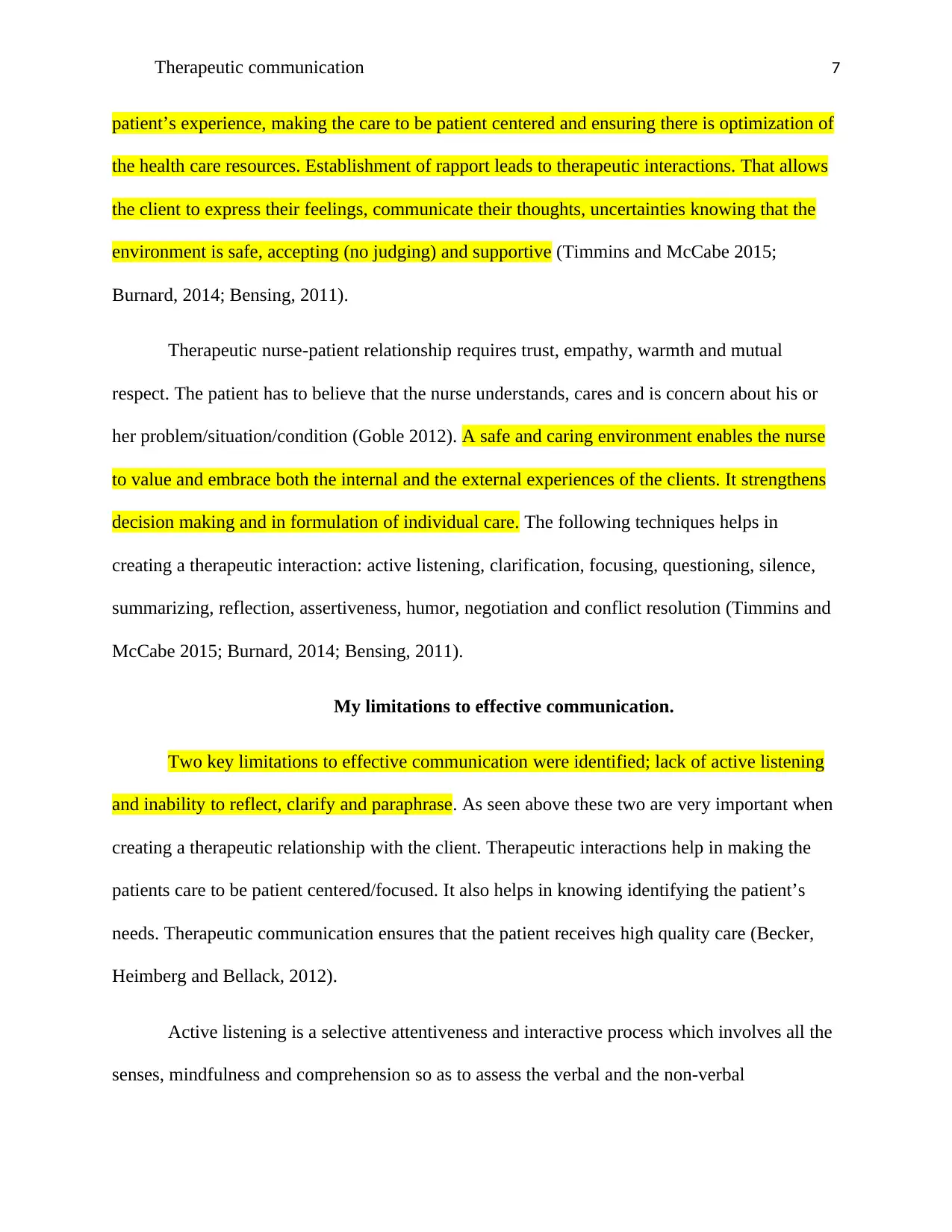
Therapeutic communication 7
patient’s experience, making the care to be patient centered and ensuring there is optimization of
the health care resources. Establishment of rapport leads to therapeutic interactions. That allows
the client to express their feelings, communicate their thoughts, uncertainties knowing that the
environment is safe, accepting (no judging) and supportive (Timmins and McCabe 2015;
Burnard, 2014; Bensing, 2011).
Therapeutic nurse-patient relationship requires trust, empathy, warmth and mutual
respect. The patient has to believe that the nurse understands, cares and is concern about his or
her problem/situation/condition (Goble 2012). A safe and caring environment enables the nurse
to value and embrace both the internal and the external experiences of the clients. It strengthens
decision making and in formulation of individual care. The following techniques helps in
creating a therapeutic interaction: active listening, clarification, focusing, questioning, silence,
summarizing, reflection, assertiveness, humor, negotiation and conflict resolution (Timmins and
McCabe 2015; Burnard, 2014; Bensing, 2011).
My limitations to effective communication.
Two key limitations to effective communication were identified; lack of active listening
and inability to reflect, clarify and paraphrase. As seen above these two are very important when
creating a therapeutic relationship with the client. Therapeutic interactions help in making the
patients care to be patient centered/focused. It also helps in knowing identifying the patient’s
needs. Therapeutic communication ensures that the patient receives high quality care (Becker,
Heimberg and Bellack, 2012).
Active listening is a selective attentiveness and interactive process which involves all the
senses, mindfulness and comprehension so as to assess the verbal and the non-verbal
patient’s experience, making the care to be patient centered and ensuring there is optimization of
the health care resources. Establishment of rapport leads to therapeutic interactions. That allows
the client to express their feelings, communicate their thoughts, uncertainties knowing that the
environment is safe, accepting (no judging) and supportive (Timmins and McCabe 2015;
Burnard, 2014; Bensing, 2011).
Therapeutic nurse-patient relationship requires trust, empathy, warmth and mutual
respect. The patient has to believe that the nurse understands, cares and is concern about his or
her problem/situation/condition (Goble 2012). A safe and caring environment enables the nurse
to value and embrace both the internal and the external experiences of the clients. It strengthens
decision making and in formulation of individual care. The following techniques helps in
creating a therapeutic interaction: active listening, clarification, focusing, questioning, silence,
summarizing, reflection, assertiveness, humor, negotiation and conflict resolution (Timmins and
McCabe 2015; Burnard, 2014; Bensing, 2011).
My limitations to effective communication.
Two key limitations to effective communication were identified; lack of active listening
and inability to reflect, clarify and paraphrase. As seen above these two are very important when
creating a therapeutic relationship with the client. Therapeutic interactions help in making the
patients care to be patient centered/focused. It also helps in knowing identifying the patient’s
needs. Therapeutic communication ensures that the patient receives high quality care (Becker,
Heimberg and Bellack, 2012).
Active listening is a selective attentiveness and interactive process which involves all the
senses, mindfulness and comprehension so as to assess the verbal and the non-verbal
Paraphrase This Document
Need a fresh take? Get an instant paraphrase of this document with our AI Paraphraser
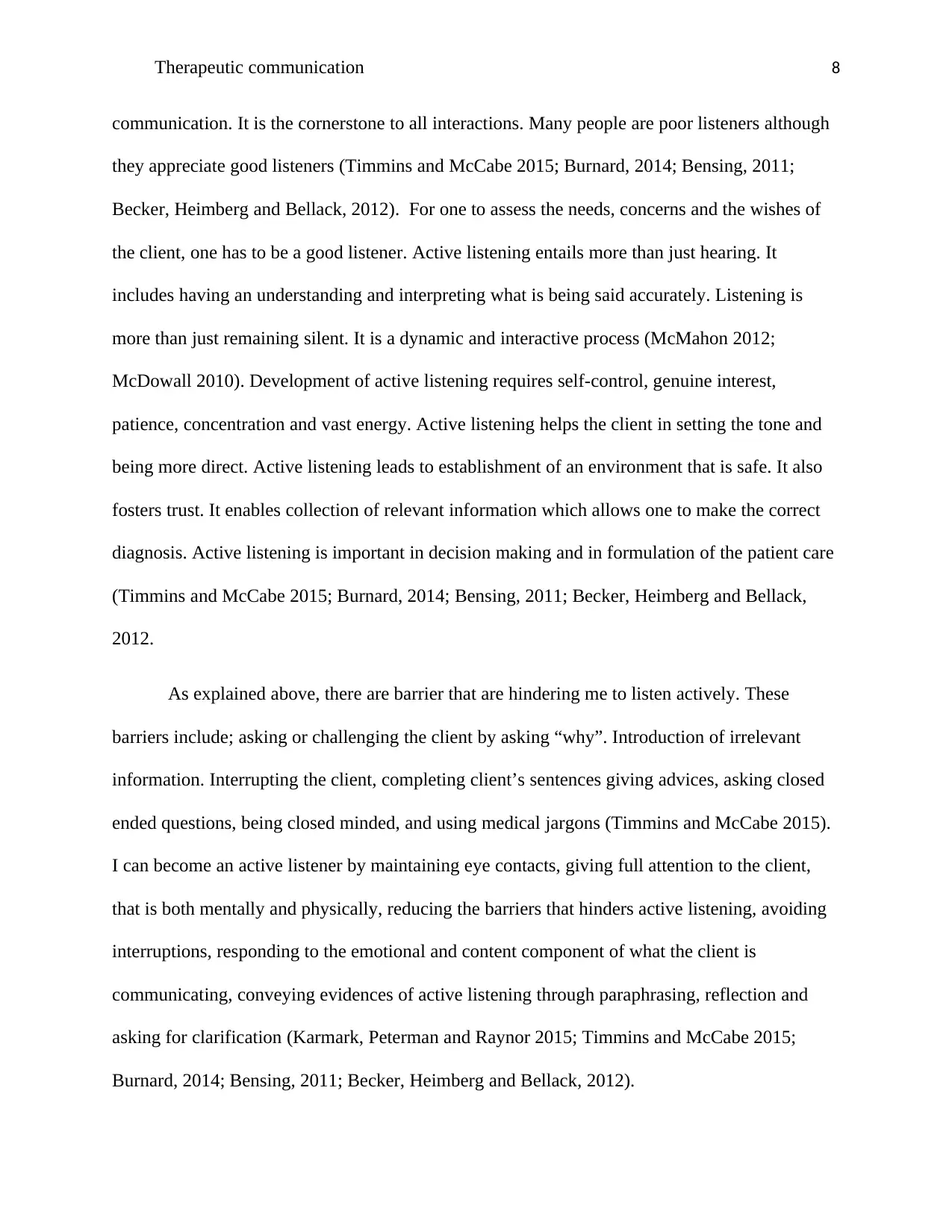
Therapeutic communication 8
communication. It is the cornerstone to all interactions. Many people are poor listeners although
they appreciate good listeners (Timmins and McCabe 2015; Burnard, 2014; Bensing, 2011;
Becker, Heimberg and Bellack, 2012). For one to assess the needs, concerns and the wishes of
the client, one has to be a good listener. Active listening entails more than just hearing. It
includes having an understanding and interpreting what is being said accurately. Listening is
more than just remaining silent. It is a dynamic and interactive process (McMahon 2012;
McDowall 2010). Development of active listening requires self-control, genuine interest,
patience, concentration and vast energy. Active listening helps the client in setting the tone and
being more direct. Active listening leads to establishment of an environment that is safe. It also
fosters trust. It enables collection of relevant information which allows one to make the correct
diagnosis. Active listening is important in decision making and in formulation of the patient care
(Timmins and McCabe 2015; Burnard, 2014; Bensing, 2011; Becker, Heimberg and Bellack,
2012.
As explained above, there are barrier that are hindering me to listen actively. These
barriers include; asking or challenging the client by asking “why”. Introduction of irrelevant
information. Interrupting the client, completing client’s sentences giving advices, asking closed
ended questions, being closed minded, and using medical jargons (Timmins and McCabe 2015).
I can become an active listener by maintaining eye contacts, giving full attention to the client,
that is both mentally and physically, reducing the barriers that hinders active listening, avoiding
interruptions, responding to the emotional and content component of what the client is
communicating, conveying evidences of active listening through paraphrasing, reflection and
asking for clarification (Karmark, Peterman and Raynor 2015; Timmins and McCabe 2015;
Burnard, 2014; Bensing, 2011; Becker, Heimberg and Bellack, 2012).
communication. It is the cornerstone to all interactions. Many people are poor listeners although
they appreciate good listeners (Timmins and McCabe 2015; Burnard, 2014; Bensing, 2011;
Becker, Heimberg and Bellack, 2012). For one to assess the needs, concerns and the wishes of
the client, one has to be a good listener. Active listening entails more than just hearing. It
includes having an understanding and interpreting what is being said accurately. Listening is
more than just remaining silent. It is a dynamic and interactive process (McMahon 2012;
McDowall 2010). Development of active listening requires self-control, genuine interest,
patience, concentration and vast energy. Active listening helps the client in setting the tone and
being more direct. Active listening leads to establishment of an environment that is safe. It also
fosters trust. It enables collection of relevant information which allows one to make the correct
diagnosis. Active listening is important in decision making and in formulation of the patient care
(Timmins and McCabe 2015; Burnard, 2014; Bensing, 2011; Becker, Heimberg and Bellack,
2012.
As explained above, there are barrier that are hindering me to listen actively. These
barriers include; asking or challenging the client by asking “why”. Introduction of irrelevant
information. Interrupting the client, completing client’s sentences giving advices, asking closed
ended questions, being closed minded, and using medical jargons (Timmins and McCabe 2015).
I can become an active listener by maintaining eye contacts, giving full attention to the client,
that is both mentally and physically, reducing the barriers that hinders active listening, avoiding
interruptions, responding to the emotional and content component of what the client is
communicating, conveying evidences of active listening through paraphrasing, reflection and
asking for clarification (Karmark, Peterman and Raynor 2015; Timmins and McCabe 2015;
Burnard, 2014; Bensing, 2011; Becker, Heimberg and Bellack, 2012).
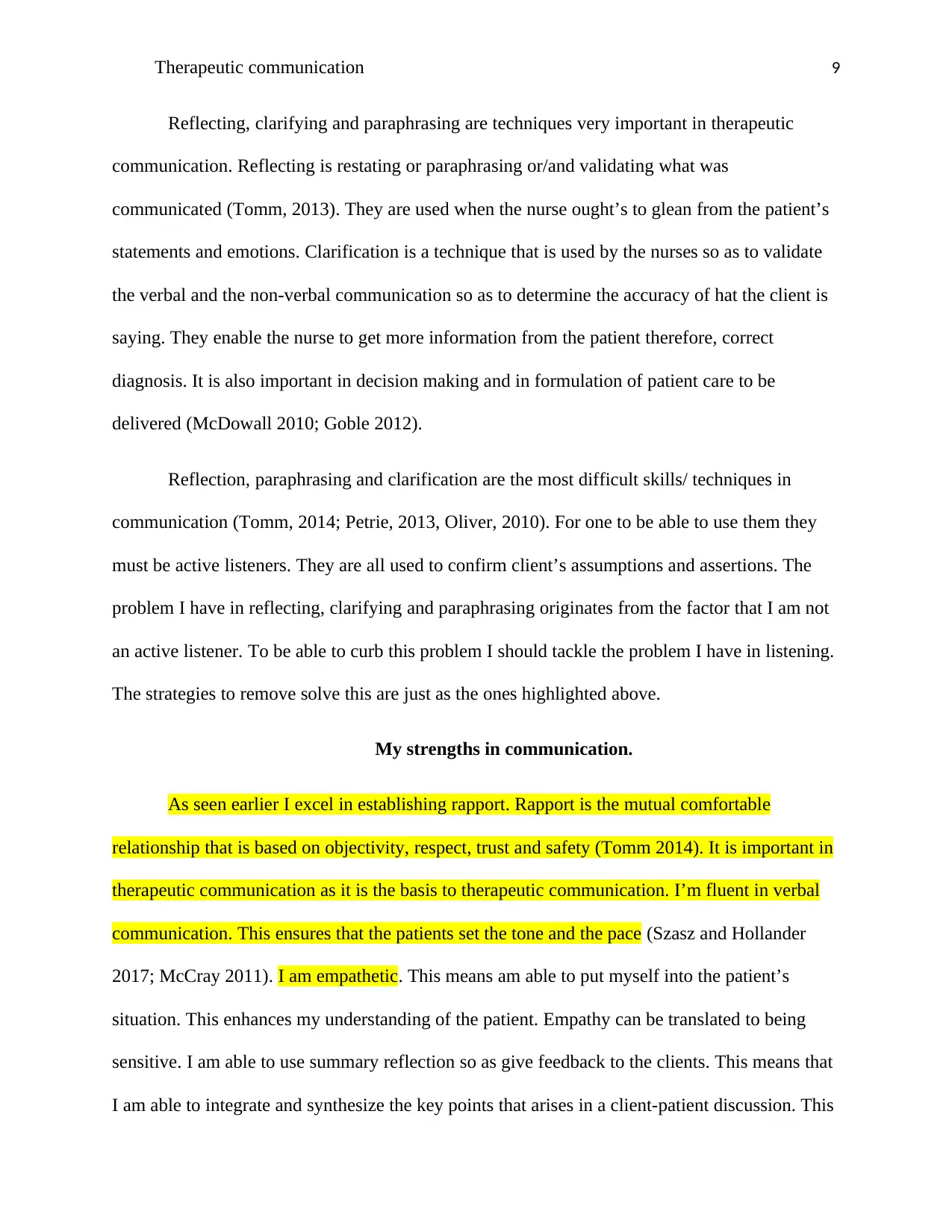
Therapeutic communication 9
Reflecting, clarifying and paraphrasing are techniques very important in therapeutic
communication. Reflecting is restating or paraphrasing or/and validating what was
communicated (Tomm, 2013). They are used when the nurse ought’s to glean from the patient’s
statements and emotions. Clarification is a technique that is used by the nurses so as to validate
the verbal and the non-verbal communication so as to determine the accuracy of hat the client is
saying. They enable the nurse to get more information from the patient therefore, correct
diagnosis. It is also important in decision making and in formulation of patient care to be
delivered (McDowall 2010; Goble 2012).
Reflection, paraphrasing and clarification are the most difficult skills/ techniques in
communication (Tomm, 2014; Petrie, 2013, Oliver, 2010). For one to be able to use them they
must be active listeners. They are all used to confirm client’s assumptions and assertions. The
problem I have in reflecting, clarifying and paraphrasing originates from the factor that I am not
an active listener. To be able to curb this problem I should tackle the problem I have in listening.
The strategies to remove solve this are just as the ones highlighted above.
My strengths in communication.
As seen earlier I excel in establishing rapport. Rapport is the mutual comfortable
relationship that is based on objectivity, respect, trust and safety (Tomm 2014). It is important in
therapeutic communication as it is the basis to therapeutic communication. I’m fluent in verbal
communication. This ensures that the patients set the tone and the pace (Szasz and Hollander
2017; McCray 2011). I am empathetic. This means am able to put myself into the patient’s
situation. This enhances my understanding of the patient. Empathy can be translated to being
sensitive. I am able to use summary reflection so as give feedback to the clients. This means that
I am able to integrate and synthesize the key points that arises in a client-patient discussion. This
Reflecting, clarifying and paraphrasing are techniques very important in therapeutic
communication. Reflecting is restating or paraphrasing or/and validating what was
communicated (Tomm, 2013). They are used when the nurse ought’s to glean from the patient’s
statements and emotions. Clarification is a technique that is used by the nurses so as to validate
the verbal and the non-verbal communication so as to determine the accuracy of hat the client is
saying. They enable the nurse to get more information from the patient therefore, correct
diagnosis. It is also important in decision making and in formulation of patient care to be
delivered (McDowall 2010; Goble 2012).
Reflection, paraphrasing and clarification are the most difficult skills/ techniques in
communication (Tomm, 2014; Petrie, 2013, Oliver, 2010). For one to be able to use them they
must be active listeners. They are all used to confirm client’s assumptions and assertions. The
problem I have in reflecting, clarifying and paraphrasing originates from the factor that I am not
an active listener. To be able to curb this problem I should tackle the problem I have in listening.
The strategies to remove solve this are just as the ones highlighted above.
My strengths in communication.
As seen earlier I excel in establishing rapport. Rapport is the mutual comfortable
relationship that is based on objectivity, respect, trust and safety (Tomm 2014). It is important in
therapeutic communication as it is the basis to therapeutic communication. I’m fluent in verbal
communication. This ensures that the patients set the tone and the pace (Szasz and Hollander
2017; McCray 2011). I am empathetic. This means am able to put myself into the patient’s
situation. This enhances my understanding of the patient. Empathy can be translated to being
sensitive. I am able to use summary reflection so as give feedback to the clients. This means that
I am able to integrate and synthesize the key points that arises in a client-patient discussion. This
⊘ This is a preview!⊘
Do you want full access?
Subscribe today to unlock all pages.

Trusted by 1+ million students worldwide
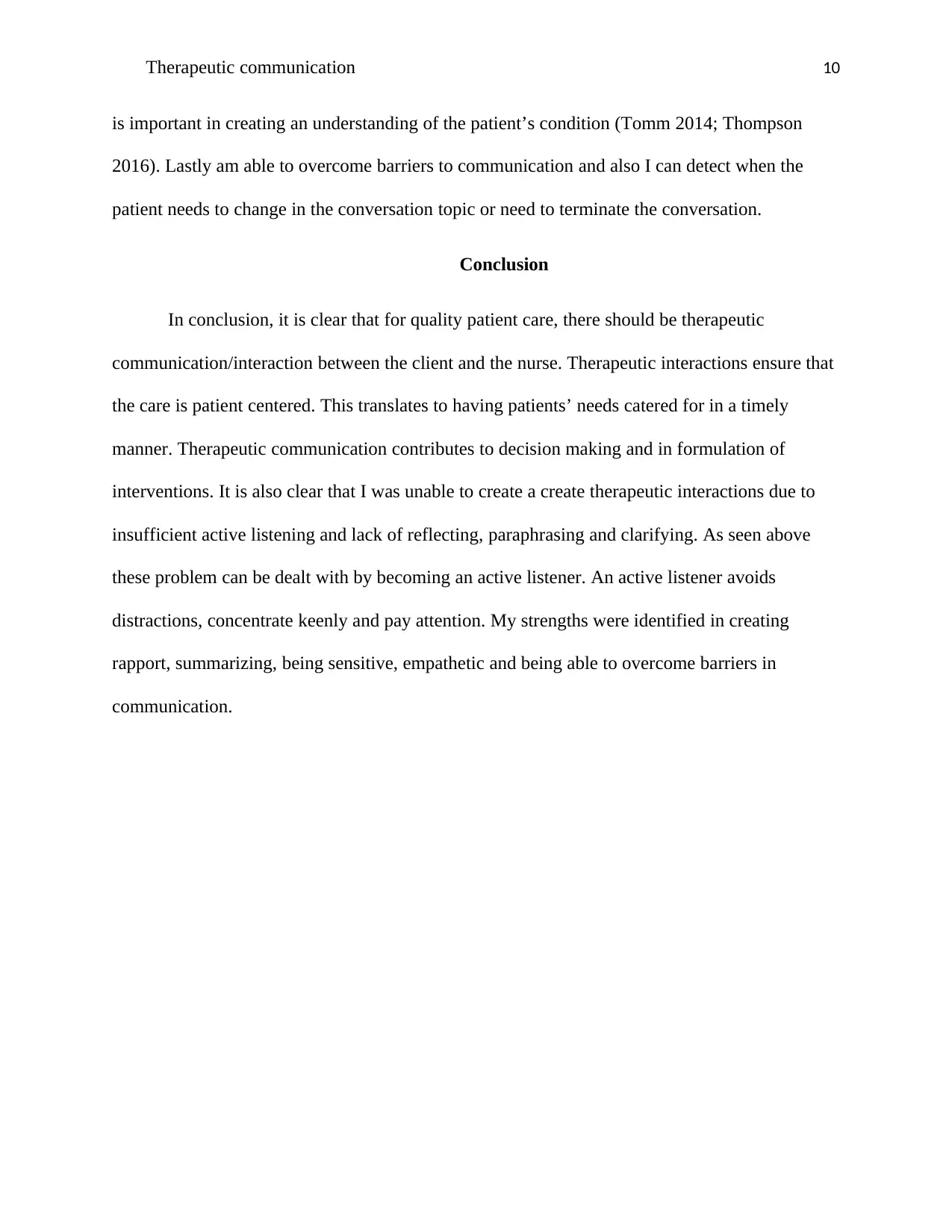
Therapeutic communication 10
is important in creating an understanding of the patient’s condition (Tomm 2014; Thompson
2016). Lastly am able to overcome barriers to communication and also I can detect when the
patient needs to change in the conversation topic or need to terminate the conversation.
Conclusion
In conclusion, it is clear that for quality patient care, there should be therapeutic
communication/interaction between the client and the nurse. Therapeutic interactions ensure that
the care is patient centered. This translates to having patients’ needs catered for in a timely
manner. Therapeutic communication contributes to decision making and in formulation of
interventions. It is also clear that I was unable to create a create therapeutic interactions due to
insufficient active listening and lack of reflecting, paraphrasing and clarifying. As seen above
these problem can be dealt with by becoming an active listener. An active listener avoids
distractions, concentrate keenly and pay attention. My strengths were identified in creating
rapport, summarizing, being sensitive, empathetic and being able to overcome barriers in
communication.
is important in creating an understanding of the patient’s condition (Tomm 2014; Thompson
2016). Lastly am able to overcome barriers to communication and also I can detect when the
patient needs to change in the conversation topic or need to terminate the conversation.
Conclusion
In conclusion, it is clear that for quality patient care, there should be therapeutic
communication/interaction between the client and the nurse. Therapeutic interactions ensure that
the care is patient centered. This translates to having patients’ needs catered for in a timely
manner. Therapeutic communication contributes to decision making and in formulation of
interventions. It is also clear that I was unable to create a create therapeutic interactions due to
insufficient active listening and lack of reflecting, paraphrasing and clarifying. As seen above
these problem can be dealt with by becoming an active listener. An active listener avoids
distractions, concentrate keenly and pay attention. My strengths were identified in creating
rapport, summarizing, being sensitive, empathetic and being able to overcome barriers in
communication.
Paraphrase This Document
Need a fresh take? Get an instant paraphrase of this document with our AI Paraphraser
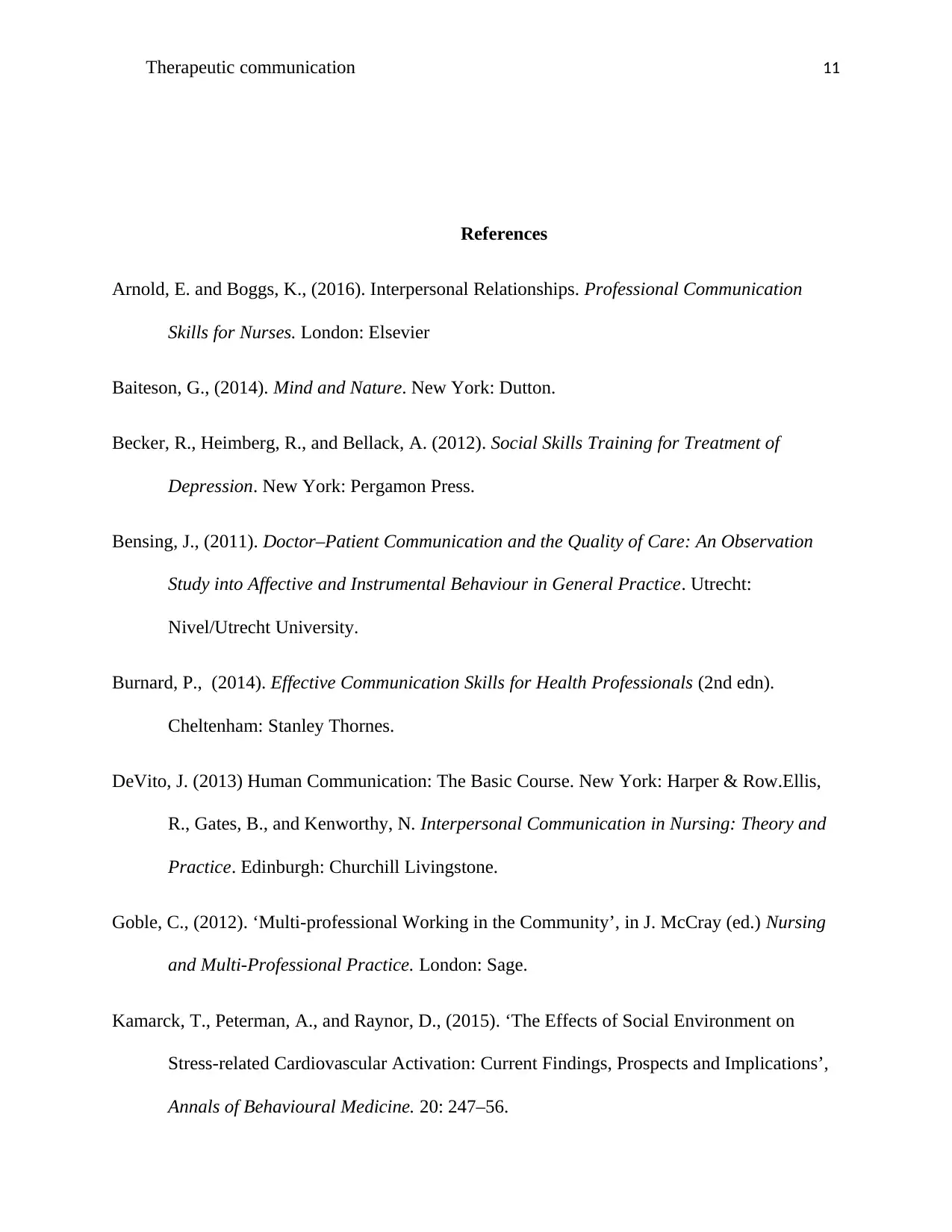
Therapeutic communication 11
References
Arnold, E. and Boggs, K., (2016). Interpersonal Relationships. Professional Communication
Skills for Nurses. London: Elsevier
Baiteson, G., (2014). Mind and Nature. New York: Dutton.
Becker, R., Heimberg, R., and Bellack, A. (2012). Social Skills Training for Treatment of
Depression. New York: Pergamon Press.
Bensing, J., (2011). Doctor–Patient Communication and the Quality of Care: An Observation
Study into Affective and Instrumental Behaviour in General Practice. Utrecht:
Nivel/Utrecht University.
Burnard, P., (2014). Effective Communication Skills for Health Professionals (2nd edn).
Cheltenham: Stanley Thornes.
DeVito, J. (2013) Human Communication: The Basic Course. New York: Harper & Row.Ellis,
R., Gates, B., and Kenworthy, N. Interpersonal Communication in Nursing: Theory and
Practice. Edinburgh: Churchill Livingstone.
Goble, C., (2012). ‘Multi-professional Working in the Community’, in J. McCray (ed.) Nursing
and Multi-Professional Practice. London: Sage.
Kamarck, T., Peterman, A., and Raynor, D., (2015). ‘The Effects of Social Environment on
Stress-related Cardiovascular Activation: Current Findings, Prospects and Implications’,
Annals of Behavioural Medicine. 20: 247–56.
References
Arnold, E. and Boggs, K., (2016). Interpersonal Relationships. Professional Communication
Skills for Nurses. London: Elsevier
Baiteson, G., (2014). Mind and Nature. New York: Dutton.
Becker, R., Heimberg, R., and Bellack, A. (2012). Social Skills Training for Treatment of
Depression. New York: Pergamon Press.
Bensing, J., (2011). Doctor–Patient Communication and the Quality of Care: An Observation
Study into Affective and Instrumental Behaviour in General Practice. Utrecht:
Nivel/Utrecht University.
Burnard, P., (2014). Effective Communication Skills for Health Professionals (2nd edn).
Cheltenham: Stanley Thornes.
DeVito, J. (2013) Human Communication: The Basic Course. New York: Harper & Row.Ellis,
R., Gates, B., and Kenworthy, N. Interpersonal Communication in Nursing: Theory and
Practice. Edinburgh: Churchill Livingstone.
Goble, C., (2012). ‘Multi-professional Working in the Community’, in J. McCray (ed.) Nursing
and Multi-Professional Practice. London: Sage.
Kamarck, T., Peterman, A., and Raynor, D., (2015). ‘The Effects of Social Environment on
Stress-related Cardiovascular Activation: Current Findings, Prospects and Implications’,
Annals of Behavioural Medicine. 20: 247–56.
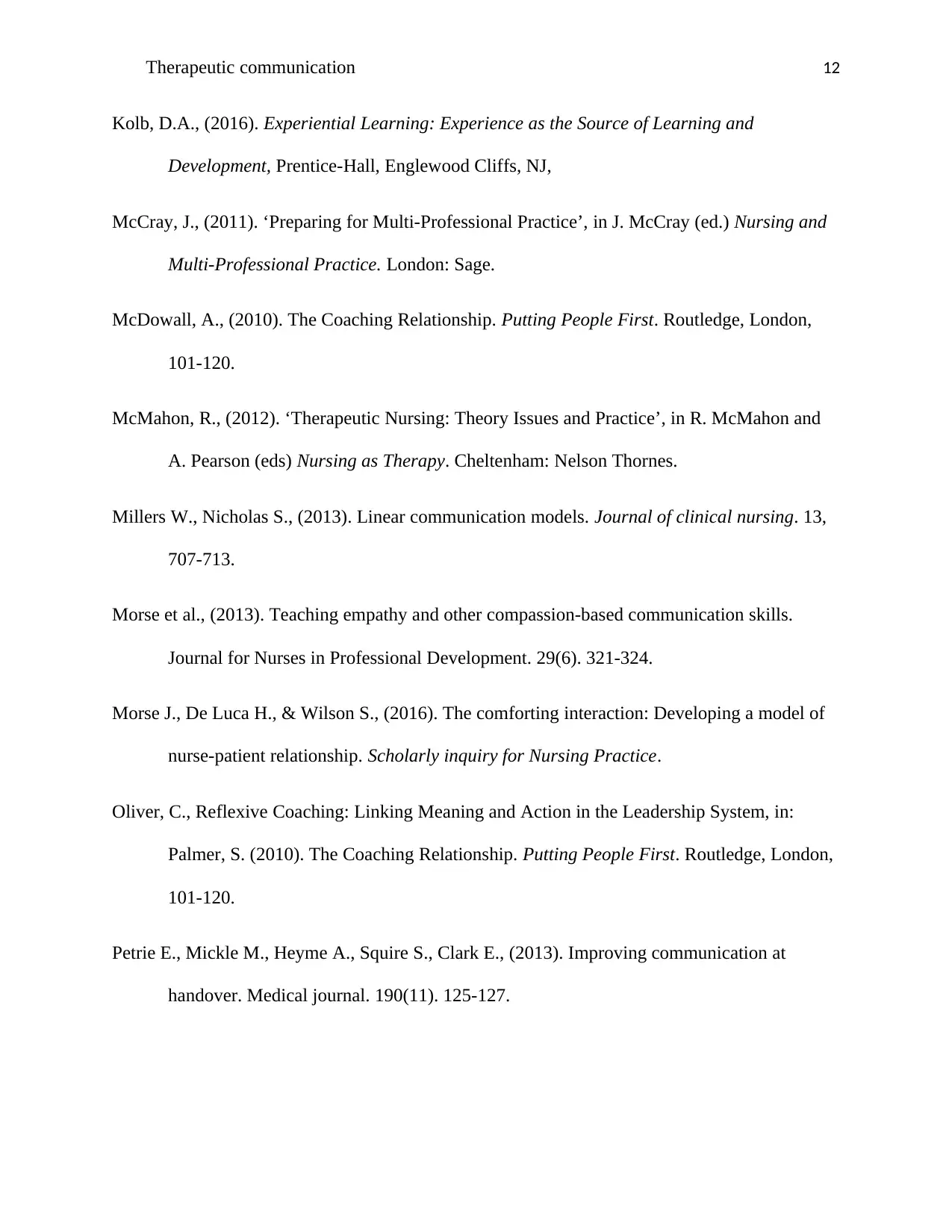
Therapeutic communication 12
Kolb, D.A., (2016). Experiential Learning: Experience as the Source of Learning and
Development, Prentice-Hall, Englewood Cliffs, NJ,
McCray, J., (2011). ‘Preparing for Multi-Professional Practice’, in J. McCray (ed.) Nursing and
Multi-Professional Practice. London: Sage.
McDowall, A., (2010). The Coaching Relationship. Putting People First. Routledge, London,
101-120.
McMahon, R., (2012). ‘Therapeutic Nursing: Theory Issues and Practice’, in R. McMahon and
A. Pearson (eds) Nursing as Therapy. Cheltenham: Nelson Thornes.
Millers W., Nicholas S., (2013). Linear communication models. Journal of clinical nursing. 13,
707-713.
Morse et al., (2013). Teaching empathy and other compassion-based communication skills.
Journal for Nurses in Professional Development. 29(6). 321-324.
Morse J., De Luca H., & Wilson S., (2016). The comforting interaction: Developing a model of
nurse-patient relationship. Scholarly inquiry for Nursing Practice.
Oliver, C., Reflexive Coaching: Linking Meaning and Action in the Leadership System, in:
Palmer, S. (2010). The Coaching Relationship. Putting People First. Routledge, London,
101-120.
Petrie E., Mickle M., Heyme A., Squire S., Clark E., (2013). Improving communication at
handover. Medical journal. 190(11). 125-127.
Kolb, D.A., (2016). Experiential Learning: Experience as the Source of Learning and
Development, Prentice-Hall, Englewood Cliffs, NJ,
McCray, J., (2011). ‘Preparing for Multi-Professional Practice’, in J. McCray (ed.) Nursing and
Multi-Professional Practice. London: Sage.
McDowall, A., (2010). The Coaching Relationship. Putting People First. Routledge, London,
101-120.
McMahon, R., (2012). ‘Therapeutic Nursing: Theory Issues and Practice’, in R. McMahon and
A. Pearson (eds) Nursing as Therapy. Cheltenham: Nelson Thornes.
Millers W., Nicholas S., (2013). Linear communication models. Journal of clinical nursing. 13,
707-713.
Morse et al., (2013). Teaching empathy and other compassion-based communication skills.
Journal for Nurses in Professional Development. 29(6). 321-324.
Morse J., De Luca H., & Wilson S., (2016). The comforting interaction: Developing a model of
nurse-patient relationship. Scholarly inquiry for Nursing Practice.
Oliver, C., Reflexive Coaching: Linking Meaning and Action in the Leadership System, in:
Palmer, S. (2010). The Coaching Relationship. Putting People First. Routledge, London,
101-120.
Petrie E., Mickle M., Heyme A., Squire S., Clark E., (2013). Improving communication at
handover. Medical journal. 190(11). 125-127.
⊘ This is a preview!⊘
Do you want full access?
Subscribe today to unlock all pages.

Trusted by 1+ million students worldwide
1 out of 16
Related Documents
Your All-in-One AI-Powered Toolkit for Academic Success.
+13062052269
info@desklib.com
Available 24*7 on WhatsApp / Email
![[object Object]](/_next/static/media/star-bottom.7253800d.svg)
Unlock your academic potential
Copyright © 2020–2026 A2Z Services. All Rights Reserved. Developed and managed by ZUCOL.





